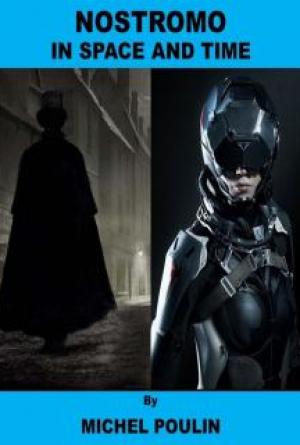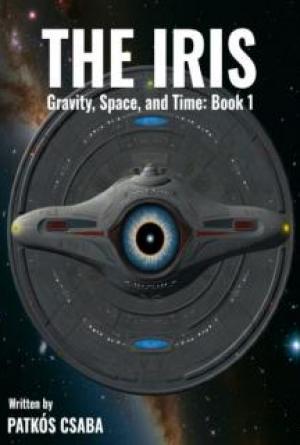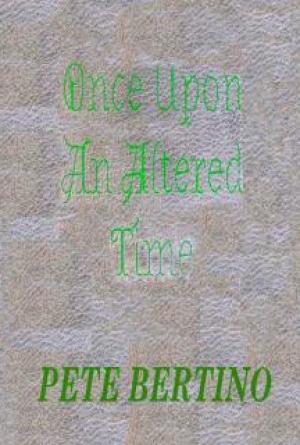THE ANSWER

Robert Hohmann smiled superciliously at the man before him. "You have nerve," he said. It might have been a compliment excepting that the tone of the words was definitely sarcastic. "You have the colossal effrontery to come here before me and tell me what I can do and what I cannot do."
Greg Hammond said, quietly, "Shall I repeat it? You are not to attempt the construction of the plutonium producing uranium pile."
"Or else—what?" sneered Hohmann.
"The United Nations makes no threats," said Greg. "We are not a military organization. We are the voice of the people—including yours, Hohmann. We merely set forth that which the people desire, and remind them of it. If someone—you in this case—goes against the will of the people, it will be for the people to decide his fate."
"You do not understand," said Hohmann, "nor can I possibly penetrate your illogic reasoning. The person is secondary to the State. Therefore it is for the State to—"
"The State is the result of the people," returned the United Nations representative. "Were it not for the people, there could be no State."
"Were it not for the State," thundered Hohmann in a ringing voice, "people could not exist in the luxury they have. Man would still be pitted against man and brother against brother. The State combines them into an insoluble unit."
"The United Nations combines all States into an insoluble unit," replied Hammond.
"Which believes itself capable of telling me what I can and cannot do!"
"You, as dictator, find little trouble in telling your subjects just how and what to do. You back up your demands with threats of death."
Hohmann smiled contentedly. "So, my bright young friend, you must admit that your United Nations organization is no different than Robert Hohmann, dictator. I issue orders which may conflict with the desires of some of my people. You issue orders which occasionally conflict with some of the desires of your States. Mine in this case."
"We issue orders only when the desires of a State are directed against the common cause," said Hammond.
"A common cause decided by people other than those who will benefit from my act," snapped Hohmann.
"This gets us nowhere," said Hammond with an air of finality. "You are, therefore, directed to cease in your plan to construct the plutonium producing uranium pile."
"The trouble with democratic organizations," said Hohmann sourly, "is that they will go to any lengths to preserve their people. Even to the point of permitting, under democratic principle, the existence of an organization directed against the democracy itself. This, they claim, shows the true strength of democracy, since if it stands even when permitting an outfit to bore from within against it, it is therefore strong. A single man is worth more than the seat of government! Ha! Well, we shall start our uranium pile, and we shall produce plutonium. And by the time your democratic organization gets through arguing, voting, and deciding what to do about us—then preparing for it—and finally acting, we can and will be unbeatable. As for you, who have the temerity to come here with your toothless demand, you shall be hostage, a worker willing or unwilling in the initial plutonium separation plant!" Hohmann turned to the guards and said: "Remove him!"
Greg Hammond was led from the large hall amid the jeers of Hohmann's cohorts. As he left, a discussion started upon the construction of the illegal uranium pile.
Hammond went quietly. He knew that he had the backing of the world, and the world would not let him down. He was convinced that Hohmann's remark was right. Greg Hammond was more valuable than government itself—and government would not let him die.
Hohmann was no fool. The dictator knew that he was bucking the combined resources of the world, and it worried him somewhat, even though he put up a brave front and daily told his people that the United Nations would not act against him.
The espionage that went on reported that little was being done. Hohmann trebled the external espionage, and multiplied the internal agencies tenfold. He was taking no chances. Materials shipped into his country were followed to the addressee, who was then investigated. Every mail carrier and delivery boy was a member of Hohmann's Intelligence Group. Shipments of manufactured articles were stopped or diverted; Hohmann knew that the plating on a cigar lighter might contain fissionable material.
But there were no moves on the part of the United Nations that Hohmann's Intelligence Group could detect.
And it was the lack of action—even lack of anything other than denunciation—that worried him into calling a Security Meeting.
His hall filled to overflowing with higher-ups, Robert Hohmann faced them and said:
"We are here because of a singular lack of activity on the part of those who have reason to fear us. Reprisals may come in many ways, some of them must be new and terrible, even though they are now undetectable. The problem of the pushbutton war is known to all—why drop bombs when bombs may be shipped in among the incoming merchandise, assembled in a tall tower, and touched off by radio. We, therefore, must locate the manner of the reprisals."
Worried faces nodded.
"This is no war of nerves," thundered Hohmann. "It is possible to cause mental confusion in someone by merely ignoring his overt act—he eventually spends more time worrying about what you intend to do about it than he does in preparation. This will not work. Admittedly we have multiplied our Intelligence Group in an effort along this same reasoning. The lack of action on the part of the United Nations has caused some concern. But we are not an individual, and we can divert a carefully calculated number of workers to investigate while the rest of us can prepare for war. The problem, again I must admit, has achieved a rather overrated proportion, hence this meeting."
Professor Haldrick looked up at Hohmann and said, quietly, "In other words, Führer Hohmann, even though you state that the so-called war of nerves cannot succeed, we are meeting to solve that very problem?"
Hohmann hissed at Haldrick and snarled for the professor to be quiet.
"Now," said Hohmann, "what has been occurring lately that might possibly be construed as being out of the line of ordinary happenings?"
General Friedrice shrugged. "I must admit that the mail has increased markedly since Hammond's incarceration. Letters pour in from all over the world to this government bureau and that government agency. They plead, they cajole, and they call names."
"I can imagine your fear at being called names," laughed Hohmann.
"Indeed, we are cringing abjectly," replied General Friedrice, who would have had to reduce his figure by at least seventy pounds before he could possibly cringe without hurting himself. "We find ourselves in a rather strange circumstance, however. These letters are, of course, saved. This makes for too much paper work."
"We can take care of that," said Hohmann idly.
"I know. But that is the only thing I know of," said Friedrice.
"Enough," said Hohmann. "This is another example of the confusion-method. Our enemies hope to worry us by doing nothing—which is expected to make us fear something ultra-secret. Well, to a certain extent they have worried us. Not to any dangerous point, however, for we are too strong to be defeated by a mental condition. This overbearing arrival of letters is another thing. All letters must be opened and read, for some of them do contain much valuable information. They must all be saved and filed, for unless we have previous letters from some correspondent, we cannot know by comparison, whether a future letter containing information is false or true. A letter giving information that comes from a known correspondent who is helpful in the past will be treated with more respect than the same information coming from someone who has written reams of misdirection, falsity, and ranting notes depicting dire results if we do not release Hammond and behave ourselves."
Hohmann shrugged.
"Even so, we cannot be shunted aside," he added. "We have plenty of people who can take care of the misdirection, just to see that something isn't happening to us. The rest of us can continue preparing. Which brings me to another point."
Hohmann paused dramatically.
"When I press this key," he said, indicating the diamond-studded telegraph-style key, "the uranium pile will start to go. The key is connected to the restrainer-rod controls of the pile; when pressed, the rods leave the pre-set positions of no-reaction and fall under the automatic controlling circuits. The pile will then start functioning at approximately ten kilowatts. After checking, it will be advanced to a more productive power, and we are making the first step toward our glorious future."
A commotion started at the door, and everybody's head turned to see the guards bringing in Greg Hammond.
He shrugged off the guards and faced Hohmann defiantly.
"The United Nations have not stopped me," said Hohmann.
"The United Nations will never try to stop you," said Hammond quietly. "We can only advise. Whatever is done, whatever may be started, we only advise. You make your own future, Hohmann. Every man makes his own future. And up until he starts that which is forbidden, he may stop with no danger. Once your uranium pile is started, Dictator Hohmann, you cannot retrack."
"I am about to start it now," smiled Hohmann.
"I warn you again to stop and think. You are not violating our laws until you press that key, therefore we can initiate no punishment. Once the key is pressed and the uranium pile starts, you are a violator and subject to punishment."
Hohmann laughed uproariously. "This starting will be secret," he said. "Just as any starting may be secret. I, give me credit for it, gave warning; otherwise we might have completed our pile of bombs and been ready to attack before your precious, toothless organization could act."
"We may not be toothless," said Hammond. "I ask you to consider, and once again warn you to desist. Building the pile is a misdemeanor. Producing plutonium is outlawed. The final analysis, Hohmann, is whether the plutonium is separated or not."
Hohmann laughed again. "You cavil," he told the United Nations representative. "First it was mere contemplation that was evil. Then the start was considered evil. Now we find that you think it dangerous but not evil until we start the pile. Next you tell us that we can start our pile providing we do not use the plutonium it produces. Each time you back up—like the average democracy. Your final step of course, is to protest vigorously while the bombs are exploding in your cities. Fool!"
He reached for the key.
"Stop," said Hammond. "It is dangerous."
"So is crossing any street," said Führer Hohmann.
He pressed the key vigorously, and a simultaneous flash went off, taking his picture for history. Somewhere in the country, well hidden and removed from danger to the populace, the control rods moved, and a flow of neutrons started to pass upward through the great pile of uranium and moderator.
The nerves of the men present twitched. Strain. Those who held fear of reprisals were half expecting something dire to happen simultaneously with the start of the pile. Those who had no fear felt the surge of exultation as they took their first real step towards world domination.
It grew warm in the room, but nothing happened. Then as the first report came in that the uranium pile was working, Hohmann dismissed the audience with a grand promise for the future.
Führer Hohmann faced General Unger with fury. "You must be more careful!" exploded Hohmann.
"But I am careful," returned the general.
"Then why do I receive a letter that is radioactive?" demanded Hohmann angrily. "Feel it—it is warm!"
Unger felt the letter but felt nothing untoward. "I feel nothing," he said.
Hohmann opened a cabinet and removed a counter. He held the letter to it and the counter clicked in rapid succession.
"See?" stormed Hohmann. "Now, before you find yourself removed from public—and private—life, tell me how and why this must happen?"
"If it actually happened, it is an error, and some underling will be treated severely—"
"The head will be treated severely as a warning," shouted Hohmann. "Pass no buck, Unger. Your men are responsible to you—but you are equally responsible for them. Me—I think I will kill you myself! You might have deprived our people of a leader!"
Hohmann advanced toward the general, who faded back away from him. Across the vast office went the two of them, slowly and stalking, catlike. The general backed up, his face contorted with fear.
"Yesterday I start our pile," stormed Hohmann, "and this morning I get a radioactive letter! Twenty-four hours! Have you no shielding around that pile?" Hohmann grinned wolfishly. "Seems to me that I should lock you up in your own office over at the laboratory. Then you'd find that shielding is desirable, you idiot. Radiating like this—to render hot a letter, or pile of paper from which this letter came. Bah!"
He went forward again, and General Unger felt the dilemma he was in. He could not strike back; to kill this leader would bring about his own very slow and very painful death. To submit was death, but Hohmann was a good pistol shot and it would be quick. Yet to prolong life for another few precious moments, Unger retreated before the blazing eyes of his leader.
He backed, and felt the filing cabinets block his further retreat. He had crossed the vast office, backwards.
He pressed back against the cabinets and felt a warm wave of fear flush up through him. It rose and rose, and he pressed harder and harder back against the cabinets—
His yell of pain shattered the air. Hohmann startled, and the pistol went off with a loud racket. It missed, but General Unger was facing away from him, looking at the cabinets and rubbing his elbow.
Tentatively, Unger reached forward and touched a finger to the handle of the nearest file drawer.
He jerked it back, and blew upon it.
"Hohmann," he said. "They're hot!"
"Hot, you idiot?" screamed Hohmann. He wet his forefinger and touched the metal of the drawer. There was a faint sizzle and Hohmann jerked his hand back too.
"Fire!" he yelled, racing for an extinguisher. With a hook, he hurled the drawer open and hit it with the spray. It exploded into a cloud, a cloud that choked them and sent them from the room in a hurry. Hot carbon tetrachloride vapor is not attractive.
Men piled into the room, followed shortly by the official palace firemen. Shortly the head man emerged.
"Führer," he said apologetically, "the cabinets are hot, but there has been no fire."
"No fire? Then how—"
The alarm rang again, and they raced to the office of General Friedrice, who was standing outside with a look of fear on his face.
"The file cabinets?" asked Hohmann.
The general nodded dumbly.
"Fire?"
"No—just hot."
"But there must be some reason—?"
General Unger looked up nervously. "Radioactivity?" he said.
"But to collect that much radioactivity," said Hohmann, "would take time. And why was it not noticed sooner?"
"That I do not know."
"Come—we'll read the Intelligence News Report," said Hohmann, leaving on a dead run.
He had the tape in his hand as they came up with him; they listened to his voice read the words from the tape.
"... mail carriers resign as mailboxes are hot to touch. Minor fire in business offices of Greggham & Son, no damage done. Fire departments in all cities are rushed to danger points. Conference called to discuss the outbreak of spontaneous fires in government offices. Professor Haldrick claims all fires not dangerous—"
Hohmann turned to Unger. "You're the head of Nuclear Physics," he stormed. "I want a complete report in twenty-four hours!"
The hours passed. The fires grew. No longer were they merely hotboxes, but in some important cases open flames broke out and consumed the paper. The charred ash continued to be too hot to the touch, and there was panic in the country.
Unger came at last. Dejected and pale with fear.
"Well," stormed Hohmann, "what is it?"
"I'm not certain other than its effect," said Unger shakily. "All paper is artificially radioactive, and it heats up when the radioelements approach the critical mass—"
"Get Hammond!" screamed the dictator.
The United Nations representative was brought. He came with a smile.
"What is this?" stormed Hohmann.
"Your own decision," replied the representative. "You should not have started the pile."
"Go on," gritted Hohmann.
Greg Hammond smiled. "Plutonium has a characteristics radiation that we do not quite understand," he explained. "However, this radiation will cause fission in certain types of medium-long lived radioelements. The range of the plutonium radiation is unknown, but it is great enough to bathe the entire country. You will find that most government offices are bulging with reams and reams of correspondence, many of which are over the critical mass. Nothing happens until someone turns on a plutonium-producing uranium pile, lets it run for a few hours, and the accumulation of plutonium starts. Right now, Hohmann, you have about four hours before most of your government offices go sky-high—from their own red tape." Greg Hammond smiled. "The United Nations only advises," he said. "And many millions of letters of advice arrived, all written on radioelemental paper. Had you taken that advice, the paper would have been innocuous inside of about thirty or forty years. You did not. Now you have lost completely, Hohmann, for the radiation from that paper when bombarded with the plutonium radiation, produces a whole string of secondary radioelements in your offices, in your desks, in your bodies, and in your air. The ash from burning is still hot, Hohmann, and the trucks that will carry the deadly paper will be as deadly. Your very country will be subject to slow fission if you start another uranium pile for several hundred years. I'd advise you to stop the one that is now running, Hohmann."
"I'll let the world go up with me," screamed the dictator.
"That it will not do," said Hammond. "You see; if you do not shut it off by yourself, we'll all be dead in an hour, after which my cohorts can locate the pile with neither difficulty nor interference. Make your choice, dictator. And remember, the United Nations only advises, never demands. Our advice, however, may be said to be written with letters of fire.”
THE END.








